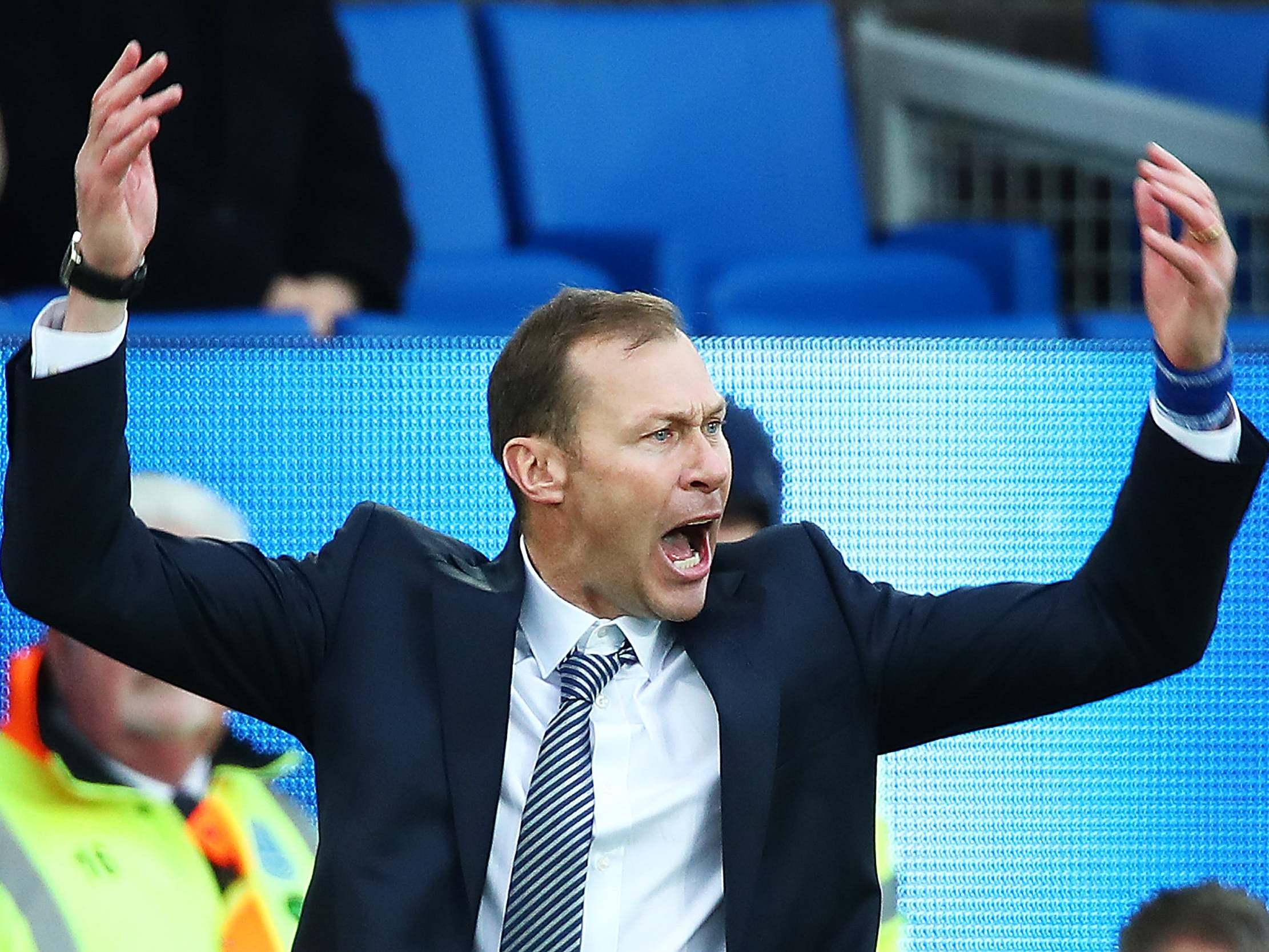Duncan Ferguson temporarily solves Everton’s identity crisis in Chelsea win with nod to the past
Howard Kendall’s old watch was worn as a memento by Everton’s caretaker manager during the 3-1 win over Chelsea

Your support helps us to tell the story
From reproductive rights to climate change to Big Tech, The Independent is on the ground when the story is developing. Whether it's investigating the financials of Elon Musk's pro-Trump PAC or producing our latest documentary, 'The A Word', which shines a light on the American women fighting for reproductive rights, we know how important it is to parse out the facts from the messaging.
At such a critical moment in US history, we need reporters on the ground. Your donation allows us to keep sending journalists to speak to both sides of the story.
The Independent is trusted by Americans across the entire political spectrum. And unlike many other quality news outlets, we choose not to lock Americans out of our reporting and analysis with paywalls. We believe quality journalism should be available to everyone, paid for by those who can afford it.
Your support makes all the difference.Duncan Ferguson was looking at the sweatband he wore on his wrist during his playing days at Everton and which he donned again for his managerial bow. Then he switched his gaze to his other arm. “I have the wristband and I have the watch,” he said. “It’s Howard Kendall’s.”
It was conveyed to Ferguson via Kendall’s widow, Lily, and his wife, Janine, on Saturday morning, a physical link to the past to accompany the emotional one. Everton’s caretaker manager began his temporary reign with a 3-1 win over Chelsea. Everton’s greatest manager had his influence, too.
“I loved Howard,” Ferguson said wistfully. If defenders and referees rarely saw his sentimental side during a career of almost unparalleled brutality, the most fearsome of footballers was welling up after his debut win. So, too, the more schmaltzy chairman Bill Kenwright, who was singing the interim manager’s name as it echoed around Goodison Park.
A surprised Frank Lampard was kissed by Ferguson – “he was in the moment and I understand the passion he has for the club,” said the understanding Chelsea manager – and, it should be stressed, it was not a Glasgow kiss.
Kenwright and owner Farhad Moshiri met Ferguson afterwards. “They were in tears,” said the Scot. “They both said congratulations, unbelievable, for giving a bit of pride back to the club. For a long time, the atmosphere hasn’t been quite at its best at Goodison.” It was electric on Saturday. Ferguson’s appointment was symbolic, galvanising Goodison Park, giving Evertonians someone to rally around, bringing euphoria where they had been anguish, but so was Kendall’s watch. “It doesnae work,” Ferguson admitted.
It was about the only thing that didn’t work for Ferguson on Saturday. His players certainly did. “We have got to make sure the work ethic, running around and covering the grass – doing the things they should be doing, anyway – remains,” he said. “There is no walking. You MUST do it. You have to cover the full-backs. You must run.” It would take a brave man to disobey him.
Ferguson has been Everton’s controversial constant, a man who has played for or coached under each of the last eight permanent managers. His charges followed instructions that seemed to stem more from Kendall and Joe Royle than Marco Silva or Roberto Martinez. There was a retro feel. “I think 4-4-2 can get a bad name but we need to make sure we were defending,” Ferguson explained. “We are not going to play pretty patterns because we have not had time to work with the players. 4-4-2 is the default position for me.”
One of Everton’s most iconic No 9s helped the current incumbent, his protégé Dominic Calvert-Lewin, score twice. They were celebrated enthusiastically by his mentor. “I’m exhausted,” Ferguson reflected. “I’m not as fit as I used to be, running up and down that touchline.”

Victory was, he felt, better than scoring his first Everton goal in a Merseyside derby. “The atmosphere is great when you score the goal and you get the adrenaline rush but this? It’s 90 minutes,” he said. “You are kicking every ball and you feel responsible.” There are parallels with the situation 25 years ago. Then, as now, Everton found themselves in the bottom three, having sacked their manager. Defeat to Chelsea would have left Ferguson contemplating the consequences for everyone at the club.
“It would have been devastating,” he said. “I would have had to live with it forever. But for the fans, as well. Relegation. We were in the bottom three, weren’t we? It would have been incredible. For the community, for everybody in this stadium. It’s their club and heaven forbid if anything went wrong.”
There is a bigger, broader question about how much a connection to the club can compensate for the lack of relevant experience and it takes in Lampard and Ole Gunnar Solskjaer as well as managers that Evertonians never really warmed to, like Silva and Sam Allardyce. It is an issue of identity and history, a matter of how much the past could and should shape the future. Saturday was emotional but Everton’s decision-making needs to be cold, clinical and correct. But suddenly Ferguson feels an option. For 90 heady minutes he resolved Everton’s identity crisis, turning back time with a watch that doesn’t work.
Join our commenting forum
Join thought-provoking conversations, follow other Independent readers and see their replies
Comments